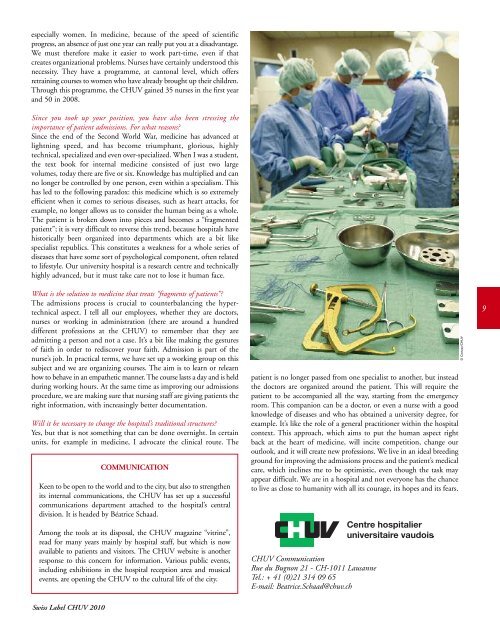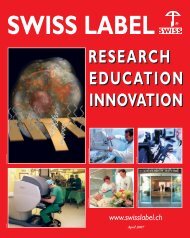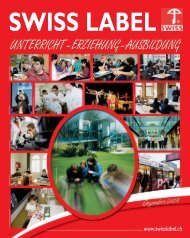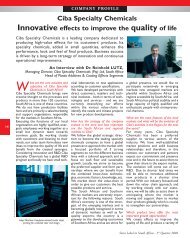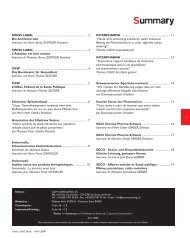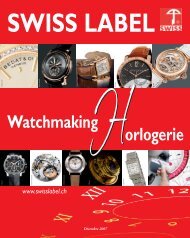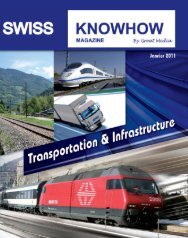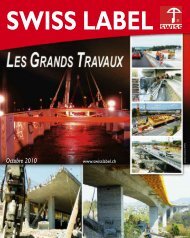SWISS LABEL INFORMATIQUE-XP - Com Consulting SA
SWISS LABEL INFORMATIQUE-XP - Com Consulting SA
SWISS LABEL INFORMATIQUE-XP - Com Consulting SA
Create successful ePaper yourself
Turn your PDF publications into a flip-book with our unique Google optimized e-Paper software.
especially women. In medicine, because of the speed of scientificprogress, an absence of just one year can really put you at a disadvantage.We must therefore make it easier to work part-time, even if thatcreates organizational problems. Nurses have certainly understood thisnecessity. They have a programme, at cantonal level, which offersretraining courses to women who have already brought up their children.Through this programme, the CHUV gained 35 nurses in the first yearand 50 in 2008.Since you took up your position, you have also been stressing theimportance of patient admissions. For what reasons?Since the end of the Second World War, medicine has advanced atlightning speed, and has become triumphant, glorious, highlytechnical, specialized and even over-specialized. When I was a student,the text book for internal medicine consisted of just two largevolumes, today there are five or six. Knowledge has multiplied and canno longer be controlled by one person, even within a specialism. Thishas led to the following paradox: this medicine which is so extremelyefficient when it comes to serious diseases, such as heart attacks, forexample, no longer allows us to consider the human being as a whole.The patient is broken down into pieces and becomes a “fragmentedpatient”; it is very difficult to reverse this trend, because hospitals havehistorically been organized into departments which are a bit likespecialist republics. This constitutes a weakness for a whole series ofdiseases that have some sort of psychological component, often relatedto lifestyle. Our university hospital is a research centre and technicallyhighly advanced, but it must take care not to lose it human face.What is the solution to medicine that treats “fragments of patients”?The admissions process is crucial to counterbalancing the hypertechnicalaspect. I tell all our employees, whether they are doctors,nurses or working in administration (there are around a hundreddifferent professions at the CHUV) to remember that they areadmitting a person and not a case. It’s a bit like making the gesturesof faith in order to rediscover your faith. Admission is part of thenurse’s job. In practical terms, we have set up a working group on thissubject and we are organizing courses. The aim is to learn or relearnhow to behave in an empathetic manner. The course lasts a day and is heldduring working hours. At the same time as improving our admissionsprocedure, we are making sure that nursing staff are giving patients theright information, with increasingly better documentation.Will it be necessary to change the hospital’s traditional structures?Yes, but that is not something that can be done overnight. In certainunits, for example in medicine, I advocate the clinical route. TheCOMMUNICATIONKeen to be open to the world and to the city, but also to strengthenits internal communications, the CHUV has set up a successfulcommunications department attached to the hospital’s centraldivision. It is headed by Béatrice Schaad.Among the tools at its disposal, the CHUV magazine “vitrine”,read for many years mainly by hospital staff, but which is nowavailable to patients and visitors. The CHUV website is anotherresponse to this concern for information. Various public events,including exhibitions in the hospital reception area and musicalevents, are opening the CHUV to the cultural life of the city.patient is no longer passed from one specialist to another, but insteadthe doctors are organized around the patient. This will require thepatient to be accompanied all the way, starting from the emergencyroom. This companion can be a doctor, or even a nurse with a goodknowledge of diseases and who has obtained a university degree, forexample. It’s like the role of a general practitioner within the hospitalcontext. This approach, which aims to put the human aspect rightback at the heart of medicine, will incite competition, change ouroutlook, and it will create new professions. We live in an ideal breedingground for improving the admissions process and the patient’s medicalcare, which inclines me to be optimistic, even though the task mayappear difficult. We are in a hospital and not everyone has the chanceto live as close to humanity with all its courage, its hopes and its fears.CHUV <strong>Com</strong>municationRue du Bugnon 21 - CH-1011 LausanneTel.: + 41 (0)21 314 09 65E-mail: Beatrice.Schaad@chuv.ch© Cemcav/CHUV9Swiss Label CHUV 2010


